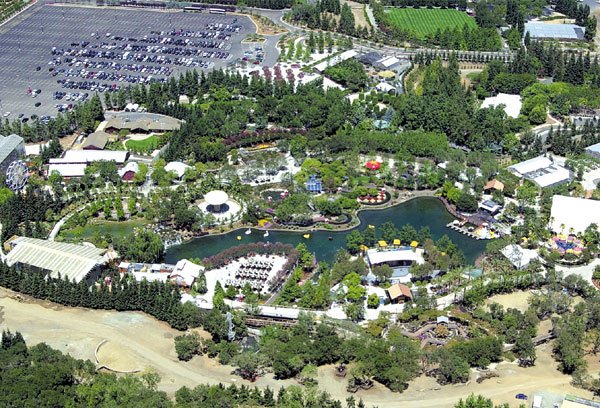The public had its first chance to weigh in on the future of
Gilory Gardens Monday night, but only a few people spoke on the
issue, one of whom was a city employee, and council members said
afterward they were surprised at the meeting’s brevity.
The public had its first chance to weigh in on the future of Gilory Gardens Monday night, but only a few people spoke on the issue, one of whom was a city employee, and council members said afterward they were surprised at the meeting’s brevity.
At points the conversation devolved to talk of city lay-offs that appear imminent given the city’s declining financial health. Some employees see an opportunity in the sale of Gilroy Gardens and surrounding land, which the city bought in February at the discounted price of $13.2 million.
Earlier this month, a group of investors from South Korea and Guam proposed to buy the Gardens and the 536 acres of mostly untouched land it sits on for $35 million, according to city officials. That’s a nearly threefold profit, but city staff pointed out before the purchase that buying the land would help the city avoid spending $41.6 million for a new community park and an additional corporation yard for city vehicles and equipment.
If a sale takes place, the first $13.2 would have to reimburse the city funds that financed the park’s purchase, and City Administrator Tom Haglund said anything left over would go into the general fund, which pays city salaries.
Councilman Bob Dillon said the capitalist within him wanted to seize this offer, but he and his colleagues agreed that they voted to buy the horticultural park to protect it and its lush surroundings from further development. But the siren of a $21.8 million profit in such dire financial times competes heavily with good intentions, and this has led to a sort of stand-still on the dais as to what the city should do.
“Selling the park is analogous to buying an $800,000 house and getting all settled in and then someone says they’ll give you $2,000,000. If that happened, there would be seven people on this dais calling a moving company,” Dillon said. “However, we do have to consider why we initially bought the park, and I have not made that decision yet.”
Neither has the collective council, which voted 7-0 at the end of the meeting to continue investigating all options and to form a task force of community member to help it forward – basically a continuation of what was already happening.
During the conversation, Councilwoman Cat Tucker called the park and land – which the county tax assessor has valued near $19 million – a “great asset” but conceded that the city faces tough fiscal times.
“We purchased the park to prevent uncontrollable development,” Tucker said. “On other hand, we do have a financial issue, but I don’t think we’re drowning yet … I’m not interested in selling.”
Councilman Peter Arellano agreed that the city should not sell the land and should continue working with residents, but he drew a few scoffs from city employees in the audience when he said, “We’re not broke.”
The mood turned, though, and a few employees clapped when Councilman Perry Woodward said, “There’s a lot of employees out there on pins and needles because we’re talking about layoffs.”
Sandra Nava was one such employee at the meeting Monday night who stood up to address the council.
“Whether or not selling Gilroy Gardens is going to help city employees not get laid off, I would like you to think about the people who are going to be affected if there are layoffs,” Nava said. “We’re all wondering, ‘Is it me? Is it me? Is it me?’ So please think about our lives, our children, our spouses, our mortgages, our cars … Some of us are a paycheck away from homelessness.” Nava’s position, technician with the city’s Housing and Community Development Department, earns between $55,312 and $67,230, according to city figures.
With emotions running high, Mayor Al Pinheiro said it was “premature” to talk about selling the Gardens before hearing from more residents, and he implored the audience to stay on track and only talk about ideas for Gilroy Gardens. He also told employees the city’s financial crisis – which the council will address at a meeting Nov. 5 – is unrelated to the park.
“Selling Gilroy Gardens won’t change Nov. 5,” Pinheiro said, adding that the city’s worsening financial situation began when “we accepted that first deficit.”
Once back on track, Councilman Craig Gartman suggested creating a new zoning called “amusement” for the park and surrounding land to ensure that no matter who owns the dirt, only things such as restaurants, small shops, outdoor recreation area and arcades could materialize.
“I keep looking back at Michael’s dream, and this is something people want to see,” Gartman said. “We could create a zoning that would officially fulfill what Michael thought from the beginning.”
Doing this would also provide clearer direction for potential park operators or investment groups. Before anyone spends money on a park, he or she will undoubtedly want to know what the future of that land entails, so figuring that out before entertaining any offers would be a logical step that would also spare the city from any accusations that it was inappropriately brokering a development deal during real estate negotiations, Haglund said.
“If you promise to (rezone) upfront in a purchase agreement, you’ve really undermined the public process which otherwise might have resulted in something different,” Haglund said.
Before the council met in closed session to discuss the Asian investor’s offer earlier this month, Haglund said “broad” provisions in the state’s open government law do allow the council to discuss issues related to the sale of the Gardens.
“The council needs to stay on topic and stay within the broad safe harbor area provided by the Brown Act,” Haglund said at the time. “In terms of evaluating (the investors’) offer, it would not be inappropriate for the seller (the city) to want to know why someone wants to buy it.”
Under state law, the council may hold closed sessions to discuss only the price and the terms of payment being offered for a particular parcel of property – which Haglund assured is all the body did. In any real estate closed session, council members cannot discuss the pros and cons of a hypothetical, what-if transaction with other could-be buyers, nor can they gab about the future design work of, say, a high-end resort at the sale site or any future environmental reports or infrastructure and parking improvements there.
Aside from the Asian investors, Haglund told the council Monday night that another “individual” had expressed interest in buying the park. Earlier Monday, the park’s nonprofit board of directors announced that it will extend its management contract with Ohio-based Cedar Fair Entertainment Company for another two years.
The board was also in talks with Parc Management, a Florida-based theme park operator. The company has indicated replacing Michael Bonfante’s struggling horticultural dream with a water park for children.
Then there’s Councilman Perry Woodward’s much smaller business idea, which he floated Sept. 15. He suggested the possibility of selling a roughly 10-acre parking lot to Eagle Ridge. The gated community, which Woodward lives in, borders the expansive and vastly under-used parking lot that serves the park’s administrative staff. Woodward suggested selling the lot to raise revenue for sidewalk repair and also to help narrow the city’s $3.9 million deficit.
With these various options and those un-thought-of ideas the expectant task force, council members have a lot to consider in the near future, but they have vowed to keep the community in mind all along. The city also has $150,000 budgeted to create a master plan for the area throughout the next two years.













